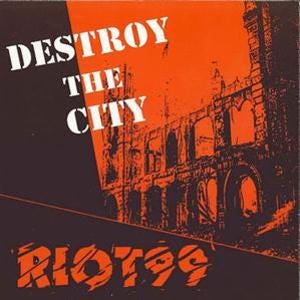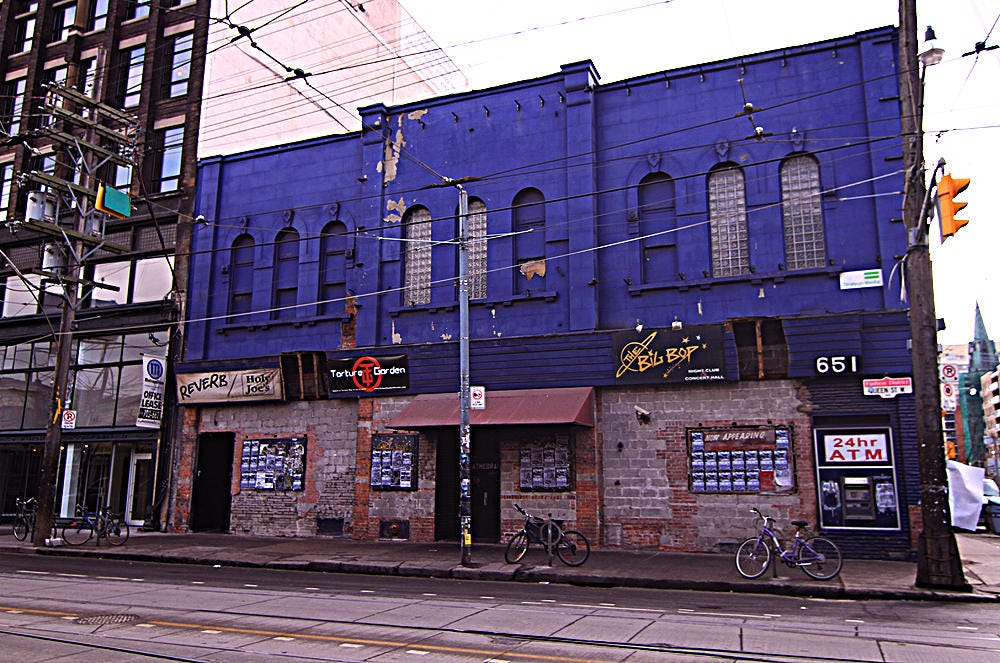I remember the Pepper Restaurant. I remember the Big Bop. I remember the Who’s Emma. I remember talking on the phone with T, who lived in Stouffville, on the edge of nowhere, as she rooted around in her closet for a leopard print whatever she meant to alter. Pepper’s is now Ronnie’s Local. The Big Bop is a Crate and Barrel. The third floor, it was called something like “heaven,” I told J when chatting with her and was prompted to remember all this, though when I looked it up later, I realized I had only been on the right track. It was called Holy Joe’s. Fitting name for a place high up on the third floor, with a cathedral ceiling. (The Kathedral was on the ground floor, with the “checkerboard floor” that, I think, is mentioned in the Hip song “Bobcaygeon.”) It was there at the all-day punk festival that the frontman of King Size Braces—Scarborough skinheads, like everyone else, or so it seemed, except for me—kicked an empty glass tumbler into the crowd and struck someone in the head. I remember the skinny bleeding guy clutching his head as somebody helped him to the door and the set went on. I remember drinking in Pepper’s with Riot99 before marching with them down Bathurst to something or other—maybe a gig. This was when the band was Howard and Nat (“Nat Scab”), Korean brother and sister, on guitar and bass, and Drew and Ter (that is, Taras—no Toronto without Ukrainians) on vocals and drums. Howard was wearing a black suit jacket and a red shirt with the collar points out. Nat, who was beautiful, some short black skirt, black tights, and leather jacket. We walked down Bathurst and I remember laughing about the hospital across the street from the funeral parlor and the Chinese restaurant: “A perfect circuit.” (The Chinese food makes you sick, puts you in the hospital, you die in the hospital, they send your corpse across the street, but the funeral parlor has a kickback deal, and guess where you end up getting served up?) I remember drinking in Pepper’s in the middle of the day. I remember drinking there at night. Manuel, the bartender, a Spaniard who looked like Ernest Borgnine stuffed in a football jersey, kept empty Coke cans behind the bar, which he would put on the table of anyone underage to pretend to be drinking in case the cops showed up. He poured Waterloo Dark, it looked like cola anyhow. I remember throwing up in the bathroom. I remember T throwing up in the bathroom. “I hate it when women can’t hold their liquor,” Andy said. (This was “Andy Class” of The Class, before he and some other guy stepped in to replace Howard and Nat, who had stormed off after some sort of drama with Drew Gates, Australian Drew, the band’s great—and, I have just learned, late—motive force.) I remember, this never happened, I only dreamed it, T sitting with her knees up, back to the wall in some darkened room, while I knelt on the gray carpet, widened a hole in her fishnets, and buried my face in her cunt. I remember sitting with her on the picnic bench outside the Who’s Emma. The Who’s Emma—anarchist bookstore beside Pepper’s, briefly lived, the name the response supposedly given by randos when asked by the bookstore staff if they knew about when Emma Goldman lived in Kensington Market. Anarchists pedants then as always. They had punk shows in the basement, or at least one. There was no stage, the pit included the singer. It was there that I first heard Drew singing Janey Jones. It was outside at that gig that I first met T—kohl-eyed punk girl, brimming with sex and death. A few years older than me. She was beautiful. (Still is. Lurking, I found her LinkedIn. She looks much the same as she did, though her hair seems like a wig.) She was sitting on the picnic table smoking. (She was, she later confessed to me, a big reader—“A book a week,” though I don’t remember what she read, besides the obligatory A Clockwork Orange.) My friend C and I had trekked downtown—we must have seen a poster somewhere—and met her in the late afternoon. That evening must have been our first time at Pepper’s. No one there ever between the ages of 19 (the legal drinking age) and 60. One time, a leatherine man with a face like a turtle’s or W. H. Auden’s told me his son played guitar with Stiv Bators of the Dead Boys, down in the New York. What did it mean to live as and where we were? I remember living on the edge of time, on the edge of a knife, but always with an inner fraudulence, since I knew I would leave, I knew I would go away. I remember late at night with E coming back from Mimico, fingering her in the streetcar stop as we waited for our train. I remember, another time, it must have been before that, riding with her and L on the streetcar back along Dundas, telling her, “I have a song I want you to listen to,” and putting on, in the earbuds, for her ears only, the song by Hitler SS. I don’t think they were real Nazis, I think they were from Italy, but anyhow what mattered was not the band, but the lyrics: “Baby, baby, wanna see you tonight. Baby, baby, wanna fuck you tonight, yeah, don’t let your daddy know, don’t let your daddy know, all right, tonight...” Stone-faced. No reaction. (Reader, I...) Always on the edge of something, sometimes becoming part of it, sometimes not. Like when sitting with friends on the bench above the ravine at Trinity Bellwoods Park the night of Nuit Blanche and hearing crack crack, crack crack, very loud, like firecrackers, and asking each other, “Was that…?” and then me saying, “No, no, I think it was firecrackers.” And then, a little while later, as with much civic virtue we carried our bottles and cans out of the park we were met on the bias by two police officers, a woman and a man, stepping down through the blackness with flashlights, and they asked us if we had seen anyone come through that way. No, we said, and, “I think they were firecrackers,” or, “They were firecrackers, not gunshots.” “Oh, you mean, they didn’t sound like this,” said the male cop, and he spun around in a 360, reaching for his gun, as if he would pull it out and fire it, but he didn’t do either, but rather laughed, ha ha haha. The news the next day told of the man who had been shot to death in his car a block over. And then there was the time they shot that guy dead on the patio of Sicilian Ice Cream (can’t make this up)—and I went there the next day or whatever to see my friend A who worked there and she was grinning from ear from ear, or rather smirking from ear to ear, if it is possible to do so, she was so elated, something had happened, and she was only sad she hadn’t been there to see it. But in point of fact there were many hints of a world violent and undefined. I remember going to the recording studio with Andy and The Class, this was before they joined Riot99, in that secret studio on College Street behind the convenience store, and the drummer walking around in the freezing winter with pants ripped open in the crotch exposing his pubic hair. I remember that shot of E, in that photograph I still have, where she is walking under the lattice of streetcar cables at the base of Queen and King and Roncesvalles, where Queen becomes the Queensway, with the blackness of the lake behind her, and the fiery heavens opening up and bleeding out in some terrible red lactation, and her hair across her face in some laceration and her eyes dark and rimmed and the cold whipping against her, like she stood at the end of the world, at that place that for me will always be the end of the world, like a lighthouse point—I remember all this, I have not looked back at it, any of it, or as little as possible. (Heaven, Holy Joe’s, what does it matter?) The past does not live in documents. Big houses on the west end of the city. Big Victorian houses that no one today could afford. An old story, one hears it all the time, the story of the closing of a dream. I don’t mean to say we got our just deserts, only that we grew up as somehow squatters in a past. What else were we supposed to be? We had received our windfall patrimony. Did we know, even then, it wouldn’t last? My advancement never felt like I was making something permanent and real, but merely the next step into nothingness. I remember my distinct conviction that I would not live past the age of, oh, 21 or so. I remember that party in college, with my ex-girlfriend, when she was upset because a friend of hers, a boy from her high school but a few years older, had been killed in a car crash in South Africa, at age 24. And I remember thinking, “I’m not going to live that long.” I mean, I said it, and she became very angry with me. And then waking up in my late 20s, it was like a hangover. Did I sire offspring out of a belief in the future, or out of a final rejection of the past—my feeling that that old world needed to be destroyed, and, with it, its foolish notion of freedom, its idea that the piper would never come to be paid: its old world’s sense that one had, in some strange way, to be both reckless and cautious, keeping one’s options open, whereas the true recklessness closes things down. I wanted to close things down. But really, it was all very safe, and, anyway, I could always leave, and I did.
Discussion about this post
No posts





A toronto ill never know :’)
Beautiful read, Paul. I don't mean to intrude upon the quasi-fictional/free associative voice of the piece (if that's even what you were going for), but I think the checkerboard floors Gord references in "Bobcaygeon" are those of The Horseshoe Tavern. My dad was at their first Toronto show in '88 which was at the Shoe and has a wonderfully beat-up tape from the night he used to play for me. I never made it to The Big Bop myself, but I've heard the stories. Glad to have yours now too.